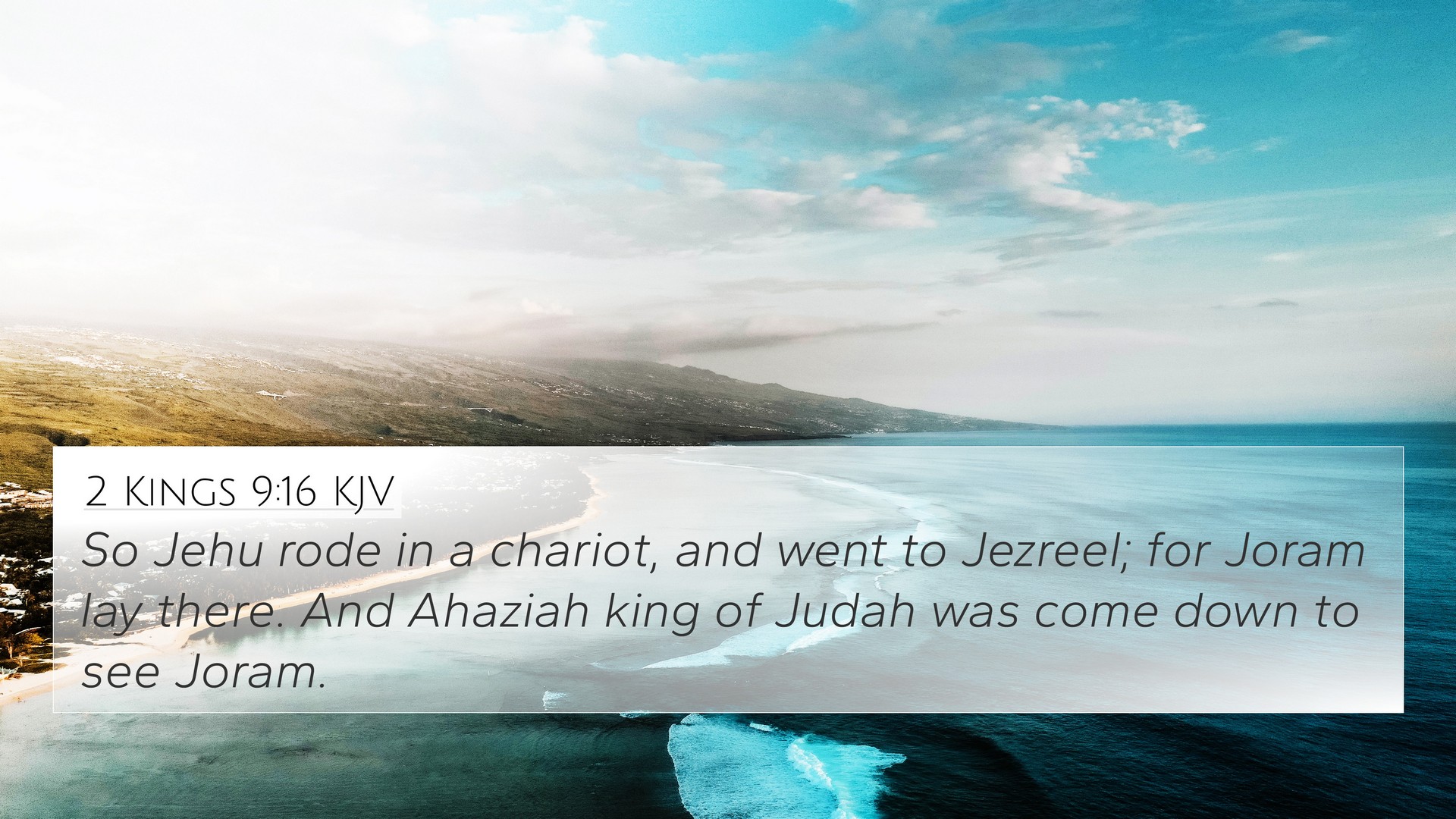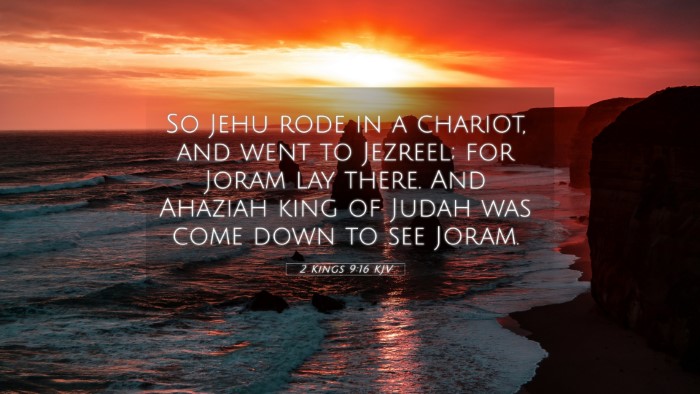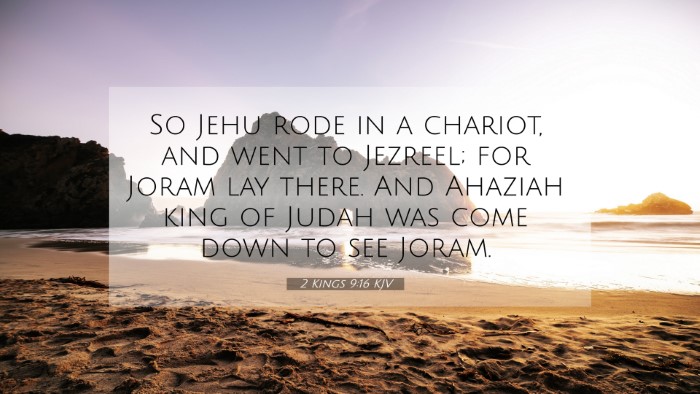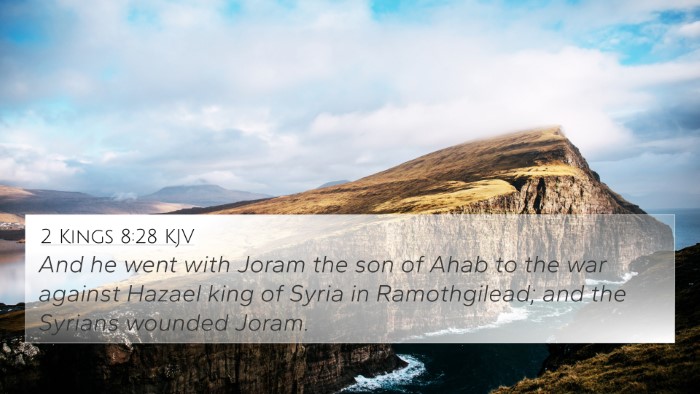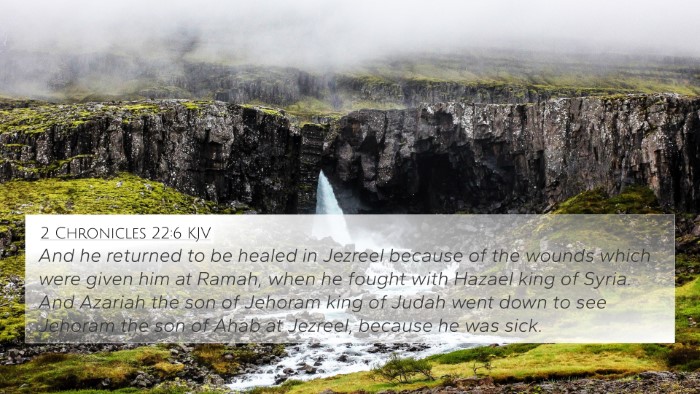Understanding 2 Kings 9:16
Verse Context: 2 Kings 9:16 states, "So Jehu mounted his chariot and went to Jezreel, for Jezebel was there, and he wanted to kill her." This verse marks a pivotal moment in the narrative concerning Jehu's rise to kingship and his mission ordained by God to eradicate the house of Ahab, particularly targeting Jezebel, who was a significant figure in promoting idolatry and immorality in Israel.
Summary of Interpretations
This verse carries deep significance within the historical narrative of the Old Testament, showcasing God's judgment against the corruption of Ahab's household. Jehu, chosen by God through the prophet Elisha, exemplifies divine intervention in history where God raises leaders to fulfill His purposes.
Insights from Public Domain Commentaries
- Matthew Henry: Henry emphasizes that Jehu's actions are a direct response to God’s command, illustrating God’s sovereignty in using leaders who might not be morally perfect but are called to carry out divine judgment. It highlights the seriousness of sin and the consequences that follow such rebellion against God.
- Albert Barnes: Barnes provides a detailed analysis of Jehu’s driving to Jezreel, interpreting it as a sign of urgency and zeal in carrying out God’s will. He discusses the ruthlessness required in Jehu’s mission, thereby drawing parallels to the broader theme of divine justice against evildoers.
- Adam Clarke: Clarke notes the historical context of Jezebel's actions and her significant role in leading Israel into idolatry through Baal worship. His commentary insists that the verse isn't merely a narrative but ripe with theological implications regarding God’s judgment and righteousness.
Bible Verse Cross-References
This verse connects with several other significant verses that illustrate themes of judgment, divine selection, and righteousness:
- 1 Kings 21:17-19 - God's judgment pronounced against Ahab for the murder of Naboth.
- 2 Kings 9:6 - Elisha anointing Jehu as king over Israel, setting the stage for this climactic moment.
- 2 Kings 10:7 - Jehu carrying out God’s judgment by executing Baal worshipers.
- 1 Kings 16:29-31 - The introduction of Ahab and Jezebel's reign, showcasing their idolatrous practices.
- Revelation 2:20 - A New Testament reflection on the teachings of Jezebel, emphasizing the ongoing implications of her actions.
- Jeremiah 51:24 - A broader example of God’s judgment against nations and individuals alike.
- Hebrews 10:31 - A reminder that it is a fearful thing to fall into the hands of the living God, echoing the seriousness of divine judgment.
Thematic Connections
This passage unveils several themes within the biblical narrative:
- Divine Sovereignty: The narrative underscores God's control in history, using Jehu as an instrument of His will.
- Judgment and Righteousness: Jehu's mission represents God's judgment against evil and corruption, especially concerning idolatry.
- Courage and Leadership: Jehu's boldness in confronting Jezebel and those associated with her evil practices reflects the qualities of a God-fearing leader.
Applications in Biblical Studies
Utilizing tools for Bible cross-referencing, one can explore deeper meanings and connections:
- Using a Bible concordance to find related themes across both Old and New Testaments.
- Employing a Bible cross-reference guide during personal study or sermon preparation to draw meaningful parallels.
- Engaging in cross-referencing Bible study to connect the actions and implications of Jehu's mission with New Testament teachings.
Conclusion
Understanding 2 Kings 9:16 is not simply about the historical account of Jehu’s actions, but about grasping the divine principles of judgment and the necessity of righteous leadership in a world veiled in sin. Inter-Biblical dialogue brings greater clarity to our understanding of pivotal characters and God’s overarching plan from the Old Testament into the revelations of the New Testament.
